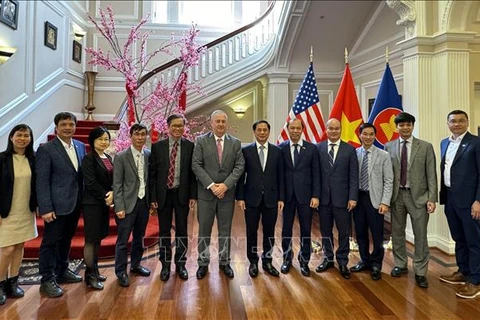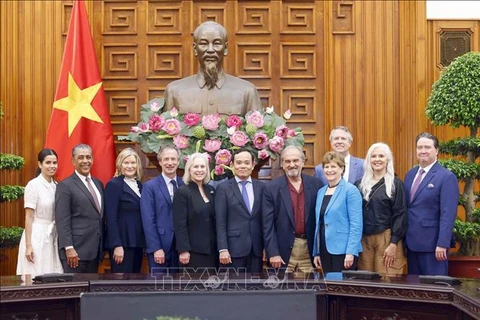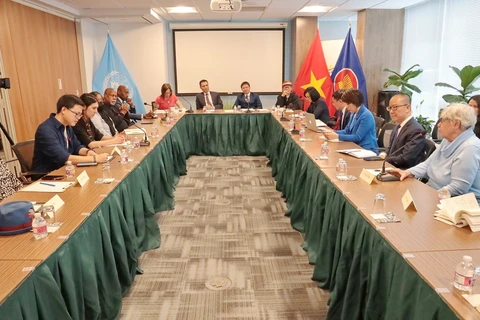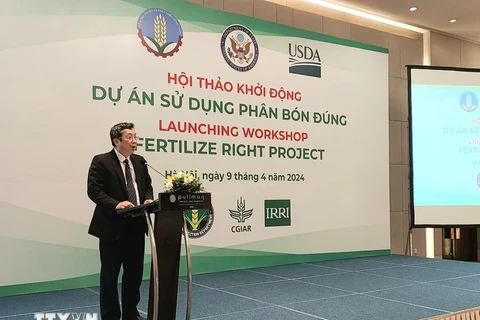 Members of MAT 19 search for explosives with specialised machines in the sandy area of Hai Lang district, Quang Tri province (Photo: VNA)
Members of MAT 19 search for explosives with specialised machines in the sandy area of Hai Lang district, Quang Tri province (Photo: VNA) According to international security researcher David Johnson from Stanford Law School, the relationship between Vietnam and the US is not only an example of healing the past wounds, but also a testament to the power of understanding and cooperation in diplomacy.
Over the past 49 years since the April 30, 1975, victory that led to the liberation of the South and the national reunification, with the spirit of “putting aside the past, overcoming differences, promoting similarities, and looking towards the future”, Vietnam and the US have been closely collaborating in overcoming war consequences, considering this a priority in their bilateral relationship, thus helping build trust and enhance mutual understanding. A significant contribution to these efforts is people-to-people diplomacy activities.
Talking to the Vietnam News Agency, Andrew Wells-Dang, who leads the Vietnam War Legacies and Reconciliation Initiative at the US Institute of Peace (USIP), emphasised that the foundation of people-to-people diplomacy, including relationships between veterans, students, entrepreneurs, and non-governmental development organisations (NGOs), is a particular aspect of the Vietnam-US relationship.
The majority of political and social groups support stronger bilateral relationships, he said, adding that this is a significant achievement in the post-war reconciliation process.
 The Vietnam Office for Seeking Missing Persons (VNOSMP hands over remains of a US soldier missing in action during the war in Vietnam to the US side. (Photo: VNA)
The Vietnam Office for Seeking Missing Persons (VNOSMP hands over remains of a US soldier missing in action during the war in Vietnam to the US side. (Photo: VNA)
For many years, NGOs, foundations, and US individual partners of the Vietnam Union of Friendship Organisations have provided support estimated in the millions of USD to care for war victims in many localities. They have built charity houses, cultural establishments, and libraries; and donated gifts and livestock to people in remote and impoverished areas, as well as to ethnic minority communities. Many groups of US students have volunteered and provided financial support and study tools for people with disabilities, and victims of Agent Orange/dioxin in various parts of Vietnam. Some projects have brought about significant reconciliation effects.
Many Americans who have witnessed the serious war consequences which Vietnamese people have been enduring for nearly half a century have decided to contribute to addressing the aftermaths of the war and the development of Vietnam as well as the bilateral relationship. Some scholars, researchers, and journalists have truthfully and objectively reflected on the US war in Vietnam and its consequences, as well as Vietnam's achievements and challenges in national development and construction.
The inclusion of the Vietnam War in educational curricula also helps young generations in the US understand more about the culture, geography, and people of Vietnam, opening doors to a deeper understanding of the Vietnamese culture and traditions. This contributes to strengthening the relationship between the two countries. Additionally, there is a growing number of young Americans coming to Vietnam to learn and teach English, contributing to building bridges to promote understanding between the two nations.
Andrew said the generation of veterans is aging, so the younger generation in both countries needs to have a clearer understanding of the war, its brutality, and the losses suffered on both sides, thus further contributing to reconciliation efforts and the development of bilateral relations.
Ron Carver, Managing Director of the Waging Peace education fund in Vietnam, stated that efforts are underway to organise a conference next year where American and Vietnamese historians can meet and discuss future cooperation strategies.
The Ho Chi Minh City-based War Remnants Museum and the US Agency for International Development (USAID) have signed a memorandum of understanding to collaborate on building an exhibition space, which is scheduled to be inaugurated in 2025, to showcase joint efforts of the two countries in overcoming the war's aftermath.
According to Prof. John Smith from Harvard University, cooperation and building the relationship together have laid the foundation for a promising future between Vietnam and the US.
Meanwhile, Prof. Sarah Brown, who specialises in diplomacy and international relations at Columbia University, said the establishment of the relationship between Vietnam and the US based on mutual respect and shared interests has created a bright spot in the multi-dimensional picture of modern international relations./.
 The Vietnam Office for Seeking Missing Persons (VNOSMP hands over remains of a US soldier missing in action during the war in Vietnam to the US side. (Photo: VNA)
The Vietnam Office for Seeking Missing Persons (VNOSMP hands over remains of a US soldier missing in action during the war in Vietnam to the US side. (Photo: VNA) For many years, NGOs, foundations, and US individual partners of the Vietnam Union of Friendship Organisations have provided support estimated in the millions of USD to care for war victims in many localities. They have built charity houses, cultural establishments, and libraries; and donated gifts and livestock to people in remote and impoverished areas, as well as to ethnic minority communities. Many groups of US students have volunteered and provided financial support and study tools for people with disabilities, and victims of Agent Orange/dioxin in various parts of Vietnam. Some projects have brought about significant reconciliation effects.
Many Americans who have witnessed the serious war consequences which Vietnamese people have been enduring for nearly half a century have decided to contribute to addressing the aftermaths of the war and the development of Vietnam as well as the bilateral relationship. Some scholars, researchers, and journalists have truthfully and objectively reflected on the US war in Vietnam and its consequences, as well as Vietnam's achievements and challenges in national development and construction.
The inclusion of the Vietnam War in educational curricula also helps young generations in the US understand more about the culture, geography, and people of Vietnam, opening doors to a deeper understanding of the Vietnamese culture and traditions. This contributes to strengthening the relationship between the two countries. Additionally, there is a growing number of young Americans coming to Vietnam to learn and teach English, contributing to building bridges to promote understanding between the two nations.
Andrew said the generation of veterans is aging, so the younger generation in both countries needs to have a clearer understanding of the war, its brutality, and the losses suffered on both sides, thus further contributing to reconciliation efforts and the development of bilateral relations.
Ron Carver, Managing Director of the Waging Peace education fund in Vietnam, stated that efforts are underway to organise a conference next year where American and Vietnamese historians can meet and discuss future cooperation strategies.
The Ho Chi Minh City-based War Remnants Museum and the US Agency for International Development (USAID) have signed a memorandum of understanding to collaborate on building an exhibition space, which is scheduled to be inaugurated in 2025, to showcase joint efforts of the two countries in overcoming the war's aftermath.
According to Prof. John Smith from Harvard University, cooperation and building the relationship together have laid the foundation for a promising future between Vietnam and the US.
Meanwhile, Prof. Sarah Brown, who specialises in diplomacy and international relations at Columbia University, said the establishment of the relationship between Vietnam and the US based on mutual respect and shared interests has created a bright spot in the multi-dimensional picture of modern international relations./.
VNA























